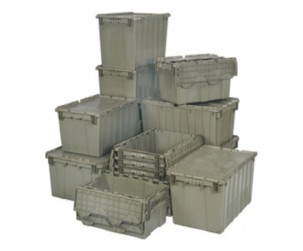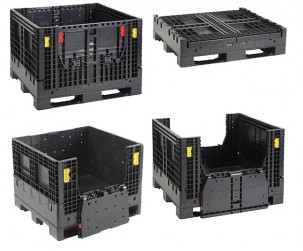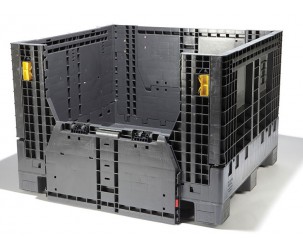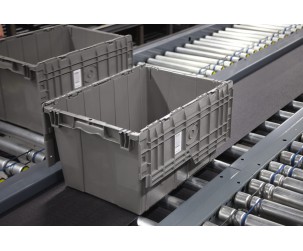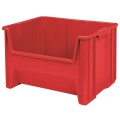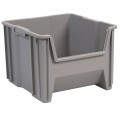LEWISBins Stack & Nest Polylewton Containers are expertly crafted for optimal space efficiency, nesting when empty and stacking when full, and are ideal for general manufacturing, food processing, and distribution applications. Manufactured from high-density polyethylene, these containers can stack at an alternating 180° position when full and nest when empty. They are built to withstand rust, corrosion, and temperature extremes from 0°F to 120°F. Additionally, these rugged totes resist oil, chemicals, solvents, water, and steam, enhancing their durability and extending their service life in demanding environments.

Benefits of Plastic Stack and Nest Containers
Plastic stack and nest containers are widely used in various sectors such as storing, transporting, retail, manufacturing, logistics, food and beverages, and more due to their versatility, durability, and economic benefits. Here are some key benefits of the plastic stack and nest containers:
♦ Space Efficiency: When not in use, these containers can be nested inside one another to save space, which is beneficial in storage areas and during transportation. When filled, they can be securely stacked on top of one another to maximize the use of vertical space.
♦ Durability: Plastic stack and nest containers are typically made from robust materials like high-density polyethylene (HDPE) or polypropylene (PP), making them resistant to impact, moisture, and chemicals. This durability enables long-term use and reuse, potentially reducing the overall costs associated with packaging and storage.
♦ Versatility: These containers are versatile and can be used in various applications. They can store and transport everything from small parts in a warehouse to fresh produce in a grocery store.
♦ Lightweight: Plastic containers are often much lighter than alternatives like metal or wood, reducing transportation costs and making handling easier.
♦ Hygienic: Plastic containers are non-absorbent and easy to clean, making them suitable for use in environments that require strict hygiene controls, such as the food and beverage industry or medical sectors.
♦ Recyclable: Many plastic stacks and nest containers are recyclable, reducing their environmental impact when they end their usable life.
♦ Cost-Effective: These containers are often more cost-effective than alternatives. They require less maintenance, have a longer lifespan, and their stackability and stability can save costs in terms of transportation and storage.
♦ Reusability: Unlike single-use packaging, plastic stack and nest containers can be used repeatedly, which makes them more environmentally friendly. The long lifespan of these containers can also make them more cost-effective in the long run.
♦ Safety: Plastic edges are generally safer than metal or wood, which can splinter or rust. The design of these containers usually includes smooth, rounded edges to minimize the risk of injury during handling.
♦ Temperature Resistant: Many plastics can withstand a wide range of temperatures, making these containers suitable for use in various environments, from refrigerated storage to hot warehouses.
♦ Customizability: Many manufacturers offer customizable options, so you can choose the size, color, and even shape of your containers to meet your needs. Some containers also have optional lids or can be designed with handles or other features to improve ease of use.
Here are some common uses of LEWISbins Polylewton Stack-Nest Containers:
♦ Manufacturing and Industrial Storage:
Component Storage: These containers are ideal for storing small parts, components, and hardware in manufacturing and assembly processes. They keep items organized and easily accessible.
-Work-in-Progress (WIP): They can transport and store work-in-progress materials, ensuring items are kept together and protected during production.
♦ Distribution and Warehousing:
-Order Picking: LEWISbins Stack-Nest Containers are commonly used in warehouses for order picking and fulfillment. They can be stacked on pallets, making them suitable for storing and transporting various products.
-Inventory Management: These containers help manage inventory efficiently by providing a uniform storage solution that can be labeled and easily tracked.
♦ Automotive Industry:
-Auto Parts Storage: Automotive manufacturers and suppliers use these containers to store and transport auto parts, such as nuts, bolts, and small components.
-Garage and Workshop Organization: Auto repair shops and garages use these containers to keep tools and equipment organized and easily accessible.
♦ Retail:
-Retail Display: LEWISbins Polylewton containers can be used as display containers for retail merchandise, especially small items like electronics, accessories, hardware, or toys.
-Backroom Storage: Retailers use these containers in their backrooms to store excess inventory, supplies, and overstock items.
♦ Food and Beverage:
-Food Processing: These containers are suitable for handling and storing food ingredients, packaging materials, and food products in the food processing industry.
-Brewery and Beverage: Breweries and beverage companies use these containers to store bottles, cans, and beverage-related materials.
♦ Healthcare and Pharmaceuticals:
-Medical Supplies: Hospitals, clinics, and healthcare facilities use these containers to store and transport medical supplies, linens, and equipment.
-Pharmaceutical Manufacturing: Pharmaceutical companies use them for the safe and organized storage of pharmaceutical ingredients and products.
♦ Recycling and Waste Management:
-Recycling Bins: LEWISbins containers can serve as recycling bins in offices, public spaces, and industrial settings for collecting recyclable materials.
-Waste Collection: They are used in waste collection and disposal processes to sort and transport waste materials.
♦ Agriculture:
Farming and Horticulture: LEWISbins containers can be used to store and transport agricultural produce, seeds, tools, and other farm-related items.
-Livestock Operations: They are suitable for organizing and storing supplies and equipment in livestock operations and feed storage areas.
♦ Educational Institutions:
-Classroom Storage: Schools and universities use these containers to organize and store educational materials, art supplies, and science equipment.
-Libraries can be used in libraries to store and transport books and archival materials.

These containers come in various sizes and configurations, making them adaptable to various storage and handling needs across different industries. Their durability and versatility make them a popular choice for businesses looking to improve organization and efficiency in their operations.


